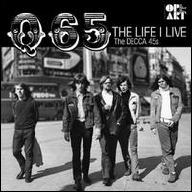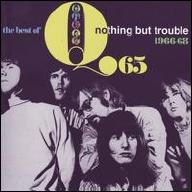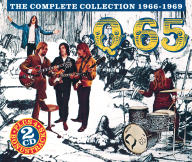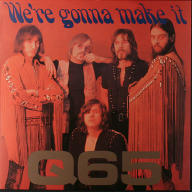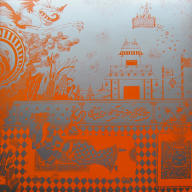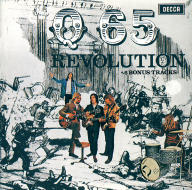Instrumental groups, patterned after the sound of the Shadows had been very big at that time. Peter Vink and Jay Baar had been playing in a blues-based band called Leadbelly's Limited before they hooked up with Wim Bieler, Frank Nuyens, and Joop Roelofs to form the Q 65 in February of 1965. The group's professed influences were American soul acts like Sam Dave, Wilson Pickett, and Otis Redding, yet somehow, when they performed, what they played came out closer in form and spirit to the likes of the Pretty Things, the Downliners Sect, and the Yardbirds than it did to any of those soul acts, at least at first. They landed a recording contract with Phonogram, a unit of Philips Records, late that year, and put on the Decca label. Their first single, You're the Victor, was released in February of 1966. This was a strange record for a band professing an admiration of Sam Dave or Wilson Pickett, a frantically paced piece of punk-style blues-rock with an infectious Bo Diddley beat, screaming, raspy vocals, and a savage attack on their instruments. The single made number 11 on the charts in Holland, and rode the bestseller lists for 13 weeks. The B-side, another original called And Your Kind, was a more low-key, relaxed piece of blues-rock with slightly more of a soulful feel, but also some crunchy punk guitar.
In May of 1966, with the group now primed for success (with a full-time manager working for them), they released their second single, The Life I Live. This was a more soulful record that built almost bolero-like in intensity. It was a good enough record to get Phonogram's management interested in promoting the group in England, which led to a publicity stunt that was not only a waste of time, but utterly foolish, sending the group to England by boat and having them come ashore in a rubber lifeboat, as though they'd come across the ocean that way. They were then supposed to play a gig, but as nobody had secured work permits, the group was only able to pose for photographs and press interviews before returning to the Netherlands. The Q 65 were greeted at the shore in Schevenning when they landed (again manning the lifeboat to land) by 30,000 fans, and ended up playing a gig right there at the pier. The band may not have done much for themselves in England, but they garnered a Top Ten hit in the Netherlands.
With two successful singles under their belt, the group's debut album, Revolution, followed in 1966. Revolution was a powerful blues-rock album that included a snarling rendition of Willie Dixon's Down in the Bottom, a rendition of Dixon's Spoonful that boasted gloriously crunchy acoustic guitars behind a raspy vocal worthy of Howlin' Wolf himself, and a funky version of Allen Toussaint's Get Out of My Life, Woman, and a handful of originals that were fully competitive with the covers. The highlight, however, was a riveting 14-minute version of Sonny Boy Williamson II's Bring It on Home. The album sold 3,5000 copies, a respectable number in the Netherlands, and established the group sufficiently to rate a spot playing with the Small Faces, the Spencer Davis Group, the Kinks, and the Pretty Things when they toured Holland.
During 1967, they didn't release any LPs, but did get a solid extended-play single out called Q Blues, which did well at home. Their music during this period reached what was arguably its peak -- Ain't That Lovin' You Babe is a garage punk classic worthy of the best American bands of the period, while their version of Ramblin' on My Mind thunders and surges with ferocious energy. They were unique in their approach, mixing the sounds of saxes and even an ocarina -- an instrument virtually unknown in rock away from the Troggs -- into country and Chicago-style blues. The group continued trying to make it as a blues-rock band for most of 1967. Their sound began to change late in the year, just as music was turning psychedelic, and around the time just before Wim Bieler was drafted into the army. His exit heralded the end of the Q 65's classic period. Nuyens, Baar, and Roelofs hooked up with Herman Brood (piano, vocals) and Henk Smitskamp (vocals, bass) to form a new, more psychedelic-oriented outfit, which eventually evolved into a group called Circus, which lasted, in varying lineups, for the year of 1968. Peter Vink, meanwhile, joined a group called Big Wheel, whose lineup included future Focus member Cyril Havermanns. In 1969, a second Q 65 album was released, entitled Revival and made up of singles and latter-day tracks. The music was still powerful and very intense -- perhaps too much so -- if not as accessible. Had the lineup stayed intact, the group might even have found an audience. They still played well, even if it was experimental in nature (and what blues they played was more psychedelic than classic style). They might've given bands like the Creation a run for their money, but the Q 65 split up at just about this point. The Q 65 re-formed in 1970 with Beer Klaasse on drums, and signed to Negram Records, staying together for one year and two LPs, Afghanistan and We Are Gonna Make It, which had a slightly more psychedelic orientation.
The Q 65's lineup changed during the early '70s as Nuyens exited to join Baar in a band called Rainman, while the Q 65 continued with a new lineup, featuring John Frederikz on vocals and Joop van Nimwegan on guitar. The original Q 65 reunited in 1980 and toured that year; they continued in various configurations throughout the middle of the '80s. Jay Baar passed away in 1990, but a version of the band, with Wim Bieler as leader, continued playing into '90s. During the early '70s, Dutch bands such as Ekseption (Holland's answer to the Nice) began getting a tiny bit of exposure in England and America, and in 1973, the floodgates fairly well opened, albeit briefly, with the chart-topping status of Focus. The Q 65 were around a little too early for their own good, in terms of finding any major exposure in England, much less America, but they were at least as worthy of being heard as any number of better-known British bands of the period. ~ Bruce Eder, Rovi


